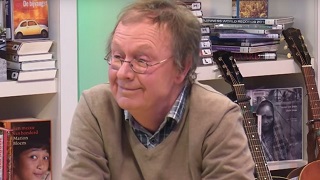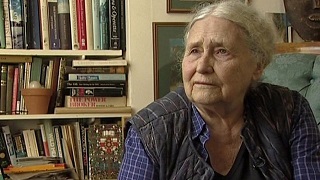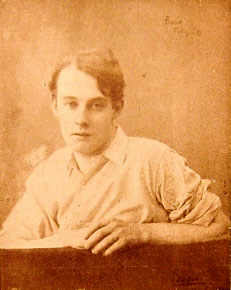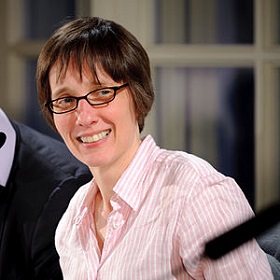|
De Nederlandse schrijver, cabaretier en televisiepresentator Arjen Henrik Lubach werd geboren in Lutjegast op 22 oktober 1979. Zie ook mijn blog van 22 oktober 2010 en eveneens alle tags voor Arjen Lubach op dit blog.
Uit: Bastaardsuiker
“Het was een woensdag en het was eindelijk warmer geworden. De dorpen in het noorden van het land waren aan het smelten.
Anna ging naar binnen en ik volgde haar. ik nam plaats in een wachtruimte en zij ging naar binnen. Mijn gedachten dwaalden af naar momenten voor het schandaal, voor Anna groot was. Hoe alles had geklopt. Het had niet veel gescheeld of alles had voor altijd geklopt. Zomers waren langer, winters strenger, mensen vriendelijker. Bedrijven waren nog geen onoplosbare kluwen van structuren, onderbazen, raden van besturen, maar gewoon gebouwen met een parkeerplek en een kamer voor de directeur.
Daarna verschenen herinneringen van na het schandaal, toen niet alles meer klopte, maar er nog genoeg was om voor te leven. De kleine Anna, de staatsbezoeken, de denktank, nieuwe uitvindingen. Tot ze uiteindelijk in de stad ging wonen en ik haar uit mijn vingers heb laten glippen.
Na vijf minuten kwam Anna naar buiten. Ze huilde.
We zijn te laat, zei ze. Ik ben een week te laat. Het mag niet meer.
(...)
Gisteren ben ik opnieuw bij hem op bezoek gegaan. Elin was er niet. Een grote ventilator hield zijn kamer koel. Hij zag er beter uit dan een paar weken geleden. Zijn matras stond omhoog
gedraaid, waardoor hij rechtop kon zitten in zijn bed.
We bleven veel stil. Soms zeiden we minutenlang niets en luisterde ik naar de apparaten die naast zijn bed stonden.
‘Ben je met iets nieuws bezig?’ vroeg hij met enige moeite.
‘Er circuleren ideeën door mijn hoofd,’ zei ik.
Een aantal keer begon ik aan een vraag. Iets over vroeger, alsof ik nog meer wilde weten dan ik al wist. Aanvullingen op het manuscript of op herinneringen waarvan de helft was versleten in de jaren. Ik vertelde hem over Emma, over mijn boeken en over Gabor. Daarna vertelde ik overjonas.”

Arjen Lubach (Lutjegast, 22 oktober 1979)
De Nederlandse dichter en schrijver Lévi Weemoedt werd geboren in Geldrop op 22 oktober 1948. Zie ook mijn blog van 22 oktober 2010 en eveneens alle tags voor Lévi Weemoedt op dit blog.
Talens & Zn
Ik was al vroeg artiest: ik won een wedstrijd kleuren;
héél jong verzon ‘k een rake limerick.
Bewierookt werd mijn vers in aangename geuren
en meen’ge fraaie beker inde ik.
Zo rees mijn ster: door tantes en vriendinnen
voor ieder woord op zoetigheid onthaald,
wordt thans mijn tong wel vorstelijk betaald:
men leest mijn lied in goud-op-snee of linnen.
Toch was ik altoos triest: al bij ’t applaudisseren
word ik bevangen door een plotseling verdriet
en moet de juich’nde zaal héél snel de rug toe keren,
terwijl ik huiverend snik: ‘ik hoor hier niet!’
Weemoedts internationale
't Liefst trok ik helpend door de hele maatschappij:
gaf 't jonge leven voor het welzijn in fabrieken,
verlichtte hier wat leed en maakte dáár wat vrij.
Bracht zo een kwinkslag aan de ongeneeslijk zieken.
Ik sloeg mijn tenten op vóór Wilton-Feyenoord,
Vermaakte 't werkvolk met wat leuke imitaties
en gekke stemmetjes of schalkse declamaties.
En stond met druivensuiker 's avonds aan de poort.
Maar wáár ik kom slaan hele klassen op de vlucht:
een werf stroomt leeg, een drukke helling wordt verlaten.
Dan keer ik bitter weer, langs onverlichte straten
en slinger troosteloos mijn feestneus door de lucht.

Lévi Weemoedt (Geldrop, 22 oktober 1948)
De Britse schrijster Doris Lessing werd geboren in Kermanshah, Perzië op 22 oktober 1919. Zie ook mijn blog van 22 oktober 2010 en eveneens alle tags voor Doris Lessing op dit blog.
Uit: The Golden Notebook
“Anna held her own private views. Now she smiled, admitting that she had been very slow.
‘When we’re so different in every way,’ said Molly, ‘it’s odd. I suppose because we both live the same kind of life — not getting married and so on. That’s all they see.’
‘Free women,’ said Anna, wryly. She added, with an anger new to Molly, so that she earned another quick scrutinizing glance from her friend: ‘They still define us in terms of relationships with men, even the best of them.’
‘Well, we do, don’t we?’ said Molly, rather tart. ‘Well, it’s awfully hard not to,’ she amended, hastily, because of the look of surprise Anna now gave her. There was a short pause, during which the women did not look at each other but reflected that a year apart was a long time, even for an old friendship.
Molly said at last, sighing: ‘Free. Do you know, when I was away, I was thinking about us, and I’ve decided that we’re a completely new type of woman. We must be, surely?’
‘There’s nothing new under the sun,’ said Anna, in an attempt at a German accent. Molly, irritated — she spoke half a dozen languages well — said: ‘There’s nothing new under the sun,’ in a perfect reproduction of a shrewd old woman’s voice, German accented.
Anna grimaced, acknowledging failure. She could not learn languages, and was too self-conscious ever to become somebody else: for a moment Molly had even looked like Mother Sugar, otherwise Mrs Marks, to whom both had gone for psycho-analysis. The reservations both had felt about the solemn and painful ritual were expressed by the pet name, ‘Mother Sugar’; which, as time passed, became a name for much more than a person, and indicated a whole way of looking at life — traditional, rooted, conservative, in spite of its scandalous familiarity with everything amoral. In spite of — that was how Anna and Molly, discussing the ritual, had felt it; recently Anna had been feeling more and more it was because of; and this was one of the things she was looking forward to discussing with her friend.”

Doris Lessing (22 oktober 1919 - 17 november 2013)
De Engelse dichter en schrijver Alfred Douglas werd geboren in Ham Hill in Worcestershire op 22 oktober 1870. Zie ook mijn blog van 22 oktober 2010 en eveneens alle tags voor Alfred Douglas op dit blog.
Le Balcon
Mere des souvenirs, mattresses des mattresses
Mother of Memories! O mistress-queen !
Oh ! all my joy and all my duty thou !
The beauty of caresses that have been,
The evenings and the hearth remember now,
Mother of Memories! O mistress-queen !
The evenings burning with the glowing fire,
And on the balcony, the rose-stained nights!
How sweet, how kind you were, my soul's desire.
We said things wonderful as chrysolites,
When evening burned beside the glowing fire.
How fair the Sun is in the evening !
How strong the soul, how high the heaven's high tower !
O first and last of every worshipped thing,
Your odorous heart's-blood filled me like a flower.
How fair the sun is in the evening !
The night grew deep between us like a pall,
And in the dark I guessed your shining eyes,
And drank your breath, O sweet, O honey-gall!
Your little feet slept on me sister-wise.
The night grew deep between us like a pall;
I can call back the days desirable,
And live all bliss again between your knees,
For where else can I find that magic spell
Save in your heart and in your Mysteries ?
I can call back the days desirable.
These vows, these scents, these kisses infinite,
Will they like young suns climbing up the skies
Rise up from some unfathomable pit,
Washed in the sea from all impurities ?
O vows, O scents, O kisses infinite !

Alfred Douglas (22 oktober 1870 – 20 maart 1945)
De Schotse schrijfster Alison Louise Kennedy werd geboren op 22 oktober 1965 in Dundee. Zie ook alle tags voor A. L. Kennedy op dit blog en ook mijn blog van 22 oktober 2010
Uit: Day
“Moustache or no moustache, that wouldn't change.
The trouble was, you had too much to do: breathing, sleeping, waking, eating: you couldn't avoid them, were built to need them, and so they just went on and on. Where were the other possibilities, the changes you might want to make—like walking off beneath the ocean—not being a fish, he bloody hated fish, but being a man tucked away in the ocean, why couldn't he try that? Why couldn't he try out whatever he thought?
And thinking itself, that wasn't helpful and yet you had to do it all the time. It was there when you dreamed, when you spoke, when you carried out your very many other compulsory tasks. If you couldn't keep control and stay wary, you might think anything, which was exactly the one freedom you'd avoid. You could dodge certain thoughts, corkscrew off and get yourself out of their way, but they'd still hunt you.
You have to watch.
This morning he could feel them, inside and out, bad thoughts getting clever with him, sly. They lapped like dirtied water behind his face and outside him they thickened the breeze until the surface touching him, pressing his lips, was far more quick and complex than only air. Today it had the smell of blue, warm Air-Force blue: the stink of drizzle rising up from wool and everywhere the smell of living blue: polish and hair oil and that sodding awful pinky-orange soap and Woodbines and Sweet Caporal and those other cheap ones, the ones they gave away after ops: Thames cigarettes, to flatten out the nerves.
"Hello, looks like London Fog again."
Pluckrose had started them calling it London Fog: the Thames smoke haze in the briefing room—him first and then everybody. One of the things they had between them as a crew: "London Fog again."
But he wouldn't remember Pluckrose, wasn't going to ask him in.
Chop it. All right?
And this time I mean it. All right?”

A. L. Kennedy (Dundee, 22 oktober 1965)
De Franse dichter en schrijver Charles Marie René Leconte de Lisle werd geboren op 22 oktober 1818 op het eiland Réunion. Zie voor ook alle tags voorCharles Leconte de Lisle op dit blog en ook mijn blog van 22 oktober 2010
Mittag
Mittag, König aller Sommer, ausgebreitet überm Land,
fällst in Silbertüchern du vom hohen blauen Firmament.
Ringsum Stille. Atemlos die Luft, sie lodert, brennt;
wie betäubt die Erde unter seinem Glutgewand.
Endlos weit das Land, die Felder gänzlich ohne Schatten,
versiegt der Quell, wo Herden einstmals Tränken hatten;
der ferne Forst mit dunkel düstrem Saum
ruht reglos schwer im weiten, tiefen Raum.
Allein der reife Weizen wogt, ein Meer in Gold,
das ferne liegt, jedwedem Schlaf abhold;
ein stiller Sohn, der heil'gem Grund entsprießt,
furchtlos zur Neige er der Sonne Trank genießt.
Zuweilen, Seufzern gleich aus dorren Seelen
regt sich im Innersten der schweren Ähren,
die murmeln, raunen, ein erhab'nes Wogen,
ersterbend an des Horizontes staub'gem Bogen.
Im Grase ruhen weiße Rinder, nicht weitab.
Der Geifer tröpfelt zäh an ihren Wammen ab.
Schläfrig, den Blick nach innen gewendet,
träumen den Traum sie, der niemals endet.
Mensch, so du freudig, ernüchtert, vergällt
des Mittags durchstreifst das gleißende Feld,
dann flieh! Es ist leer und die Sonne verzehrt dich
nichts mehr am Leben, nichts traurig, nichts fröhlich.
Doch wenn du vom Lachen und Weinen verprellt,
gekränkt vom Vergessen der hektischen Welt,
allem Verzeihens ,Verwünschens leid,
willst kosten von höchster Sinnlichkeit,
dann komm! Dass die Sonn' dir Erhab'nes sende;
in grausamer Glut geh auf ohne Ende;
kehr heim in die nichtigen Städte gemach
gehärtet im göttlichen Nichts siebenfach.
Vertaald door Bertram Kottmann

Charles Leconte de Lisle (22 oktober 1818 – 18 juli 1894)
Portret door Jean-Francois Millet, circa 1840/1841
Zie voor nog meer schrijvers van de 22e oktober ook mijn blog van 22 oktober 2011 deel 1 en eveneens deel 2.
|



